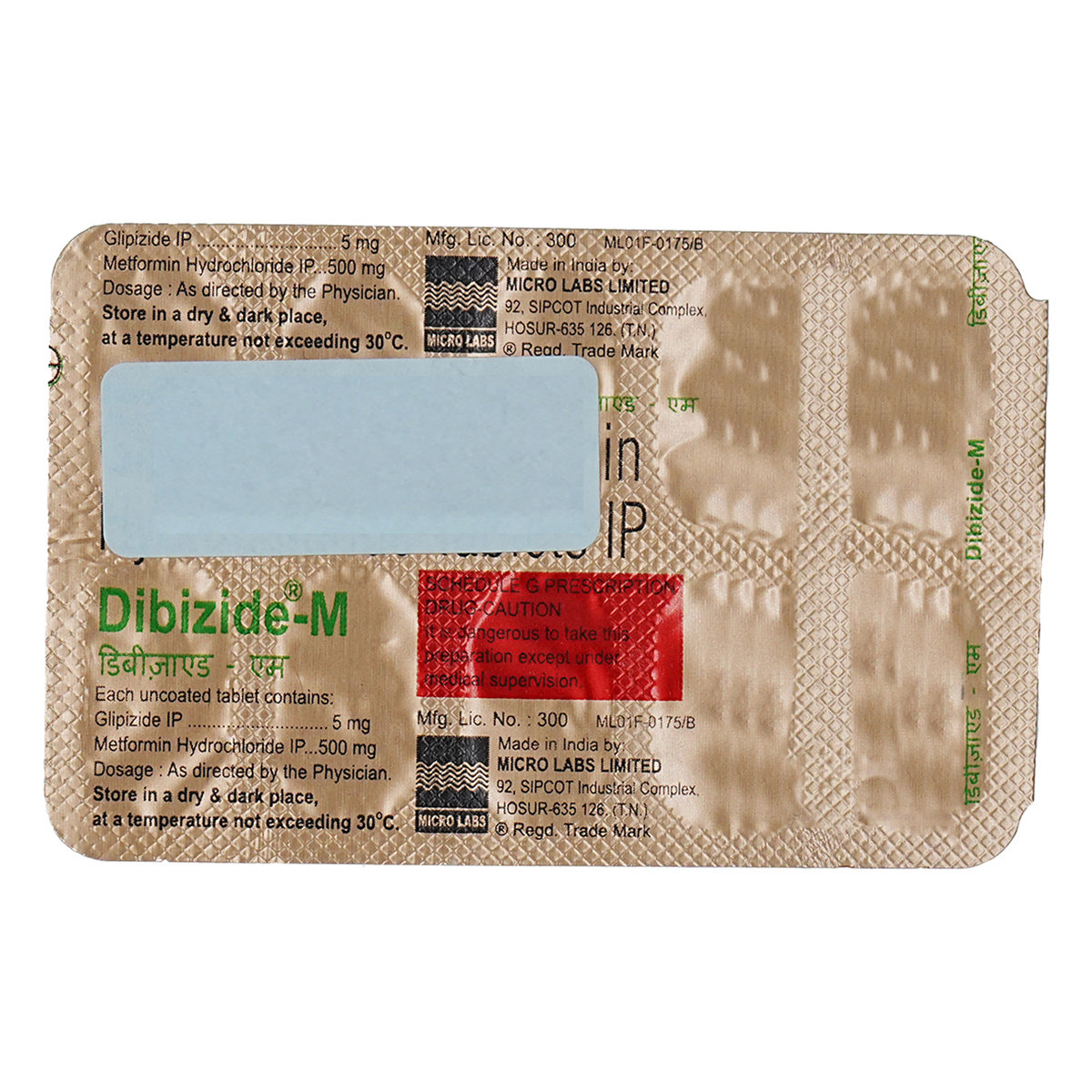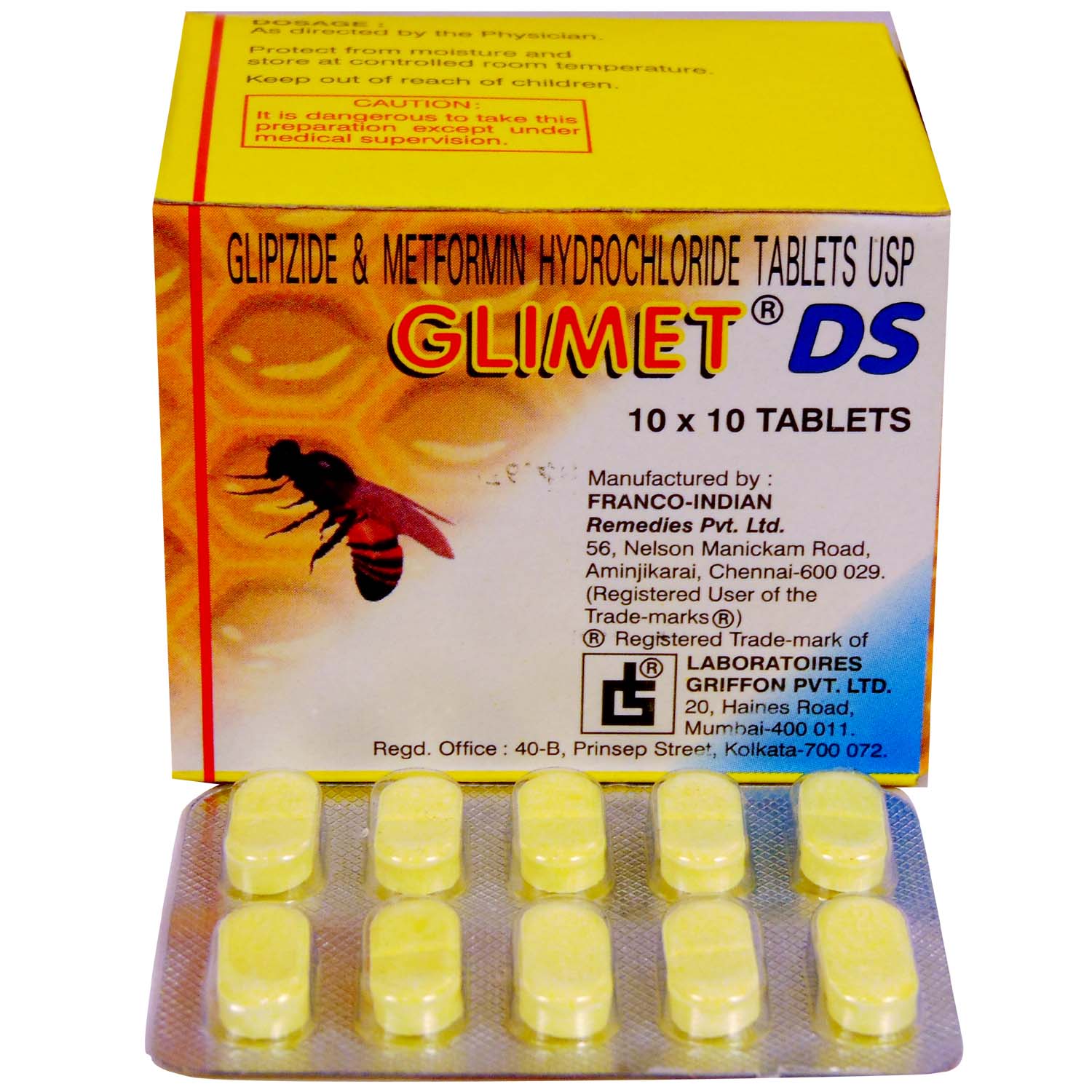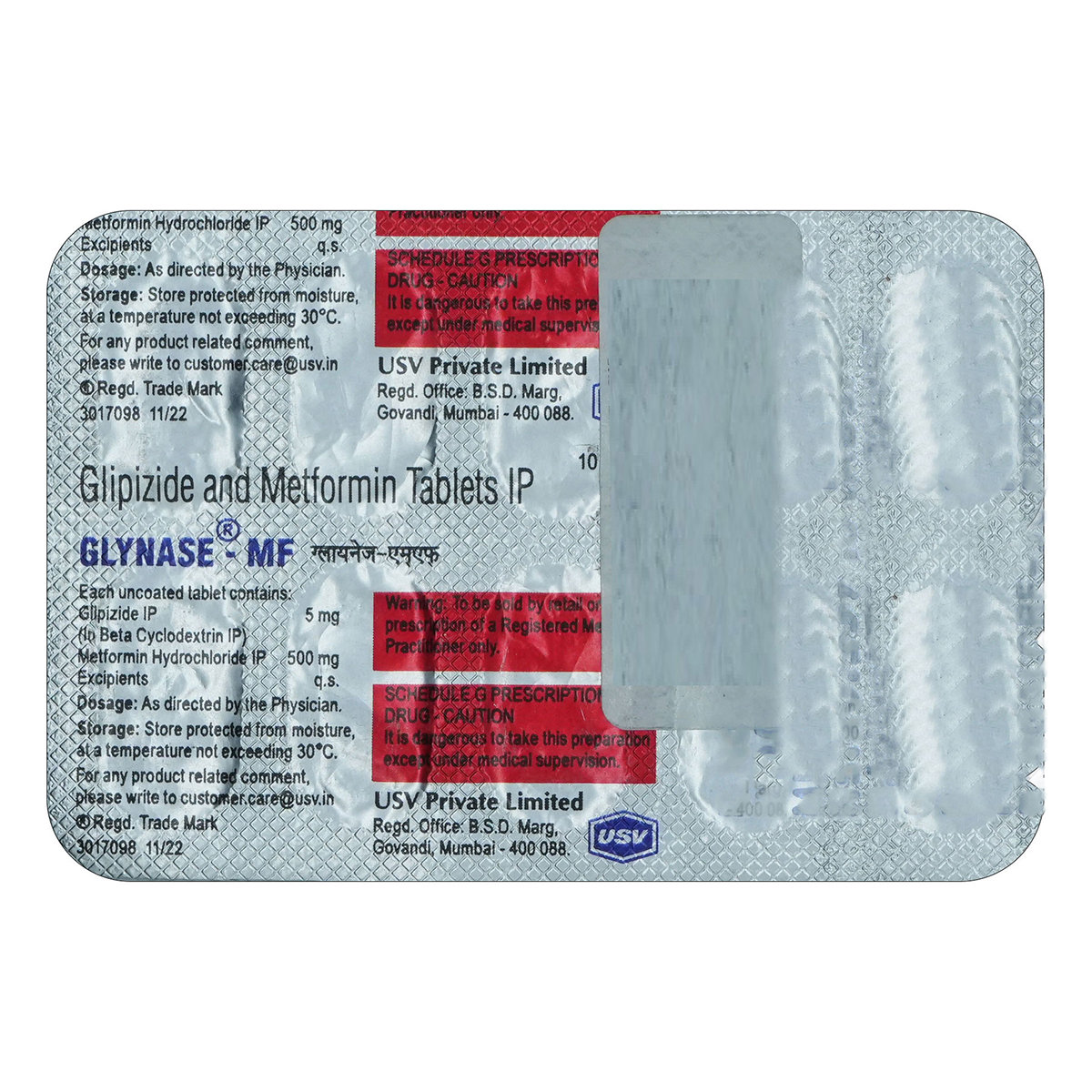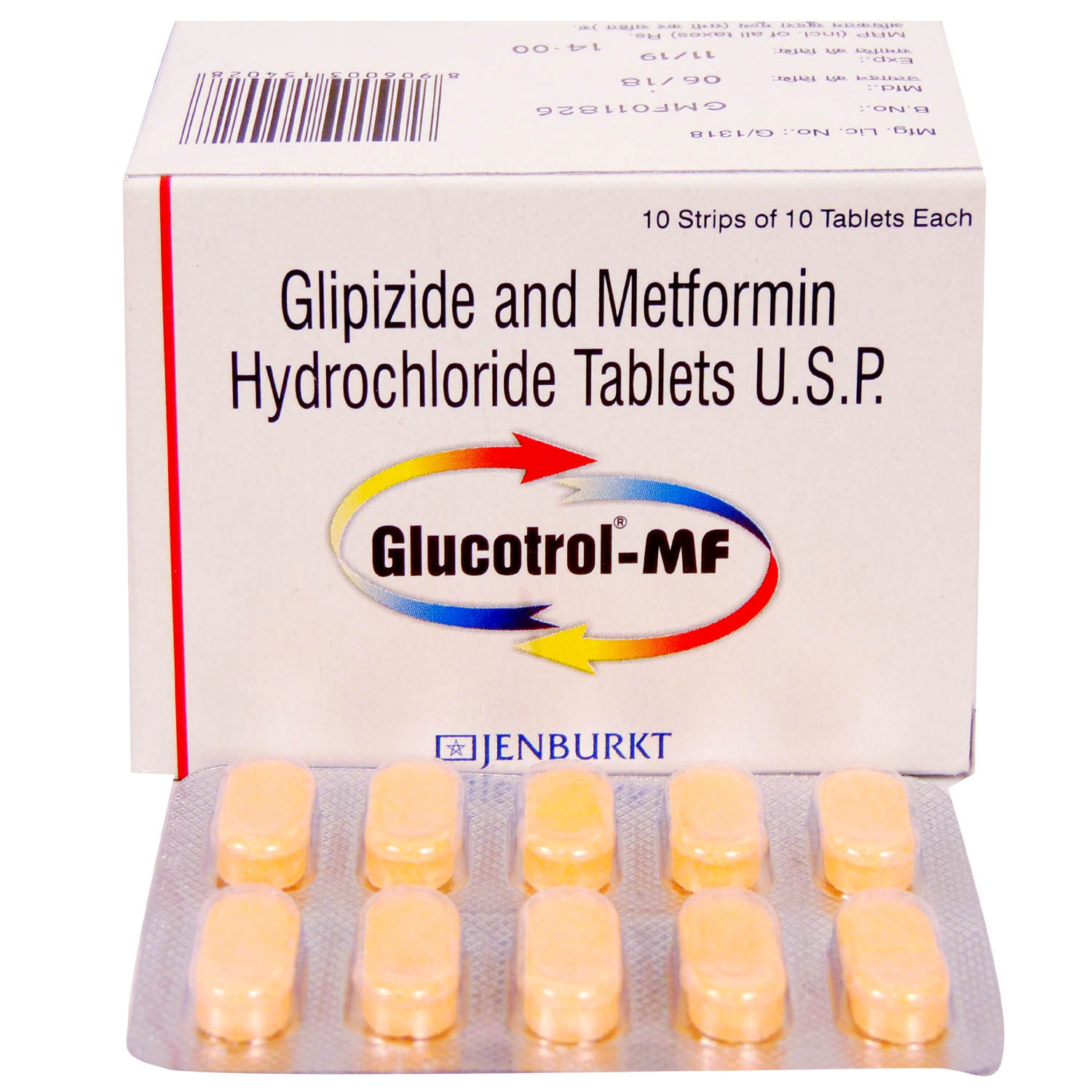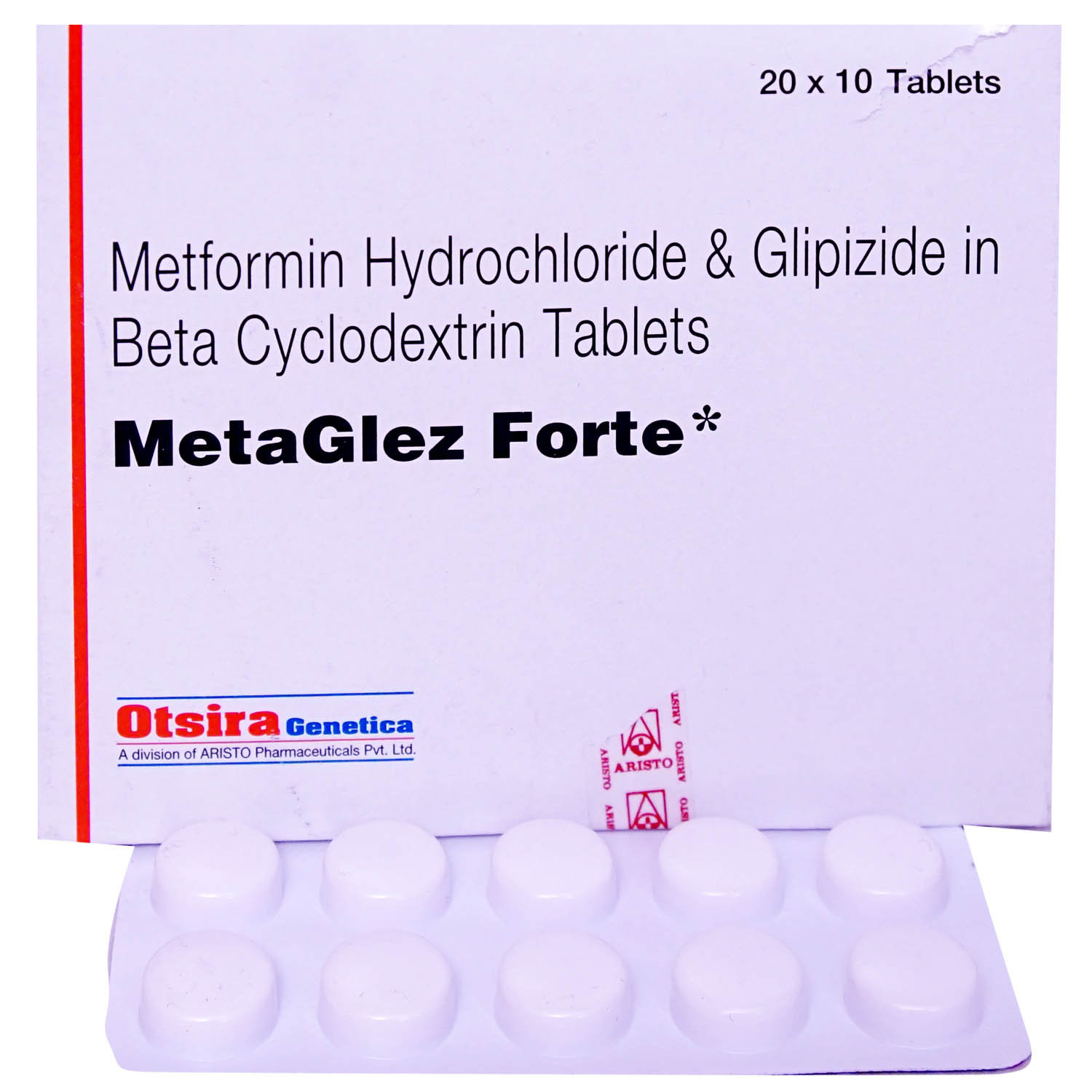Glyson-MF Tablet 10's
MRP ₹20.5
(Inclusive of all Taxes)
₹3.1 Cashback (15%)
Provide Delivery Location
Online payment accepted
 Prescription drug
Prescription drugWhats That
Composition :
Manufacturer/Marketer :
Consume Type :
Expires on or after :
Return Policy :
About Glyson-MF Tablet
Glyson-MF Tablet belongs to the class of anti-diabetic drugs. It is used in the treatment of type 2 diabetes mellitus. Diabetes mellitus is a metabolic disease that causes high blood sugar levels. It occurs when the insulin (a hormone produced by the beta cells of the pancreas) is resistant in breaking the glucose to produce energy (insulin resistance) or the pancreas (an organ behind the stomach) produces little or no insulin at all.
Glyson-MF Tablet is composed of two medicines, namely Glipizide and Metformin. Glipizide belongs to the class of sulfonylureas. It promotes insulin secretion from the beta cells of the pancreas and reduces the glucose output from the liver. It has the fastest absorption and onset of action compared to other sulfonylureas. Metformin belongs to the class of biguanides and is used to manage blood sugar levels, particularly in obese patients. It exhibits a non-pancreatic effect to reduce serum glucose levels without increasing insulin secretion. It is also known as an insulin sensitizer as it increases the effects of insulin.
Take Glyson-MF Tablet with food at regular intervals as prescribed by your doctor to avoid stomach upset. Your doctor will decide the dosage form, and this may change timely depending on your blood sugar levels. The common side effects of Glyson-MF Tablet include hypoglycemia (low blood sugar levels), nausea, diarrhoea, indigestion, headache, dizziness, blurred vision, weakness, cold sweats, stomach pain, weight gain, and oedema (swelling). Although not everyone experiences these side effects, if they occur, seek medical attention. Lactic acidosis, is a rare, but serious metabolic complication of excess lactic acid in the blood that is caused by metformin accumulation is reported. The risk of lactic acidosis is high in people with kidney, liver, and heart diseases.
Before starting Glyson-MF Tablet , let your doctor know if you have any medical history of anaemia (low haemoglobin levels), seizures (fits), heart, kidney, and liver diseases. Also, speak to your doctor if you are on restricted food or fluid intake since Glyson-MF Tablet causes dehydration, low blood sugar, and kidney damage. Do not take or stop this medicine, if the doctor did not advise you to do so.
Uses of Glyson-MF Tablet
Directions for Use
Key Benefits
Glyson-MF Tablet is used to treat type 2 diabetes mellitus. It is a combination of Glipizide and Metformin. Glipizide is effective in treating low blood sugar levels when used as an adjunct to diet and exercise. It promotes insulin secretion from the beta cells of the pancreas and reduces the glucose output from the liver. It also exhibits an extrapancreatic effect by improving insulin sensitivity at peripheral sites like muscle, fat, or liver cells. Metformin shows a non-pancreatic effect to reduce serum glucose levels without increasing insulin secretion. It is also known as an insulin sensitizer as it increases the effects of insulin. It is considered to be a unique anti-diabetic drug since it does not lower blood sugar levels.
Storage
Drug Warnings
Glyson-MF Tablet can cause weight gain hence possible measures like eating healthy food and exercising are advised. It may also increase the risk of cardiovascular diseases and hypoglycemic conditions in renal and liver disease patients. Glyson-MF Tablet sometimes causes impairment of vitamin b12 absorption and results in anaemia (low haemoglobin levels). Glyson-MF Tablet has an increased risk of lactic acidosis. The risk of lactic acidosis is high in older people with kidney, liver and heart diseases. Hence, brief your medical history and take advice from your doctor before starting Glyson-MF Tablet . Avoid consuming excessive alcohol as it can potentiate lactic acidosis.
Drug-Drug Interactions
Drug-Drug Interactions
Login/Sign Up
Co-administration of Glyson-MF Tablet with Gatifloxacin may affect blood glucose levels. Both low blood glucose and, less frequently, high blood glucose have been reported.
How to manage the interaction:
Although there is a possible interaction, Glyson-MF Tablet can be taken with Gatifloxacin if prescribed by the doctor. Consult the prescriber if you experience symptoms such as nervousness, confusion, headache, dizziness, drowsiness, tremors, nausea, hunger, weakness, perspiration, palpitation, rapid heartbeat, increased urination, increased thirst, and increased hunger. Maintaining blood glucose levels is advised. Do not discontinue the medications without consulting a doctor.
Co-administration of Glyson-MF Tablet and Iodamide can increase the risk of lactic acidosis (when the body produces too much lactic acid).
How to manage the interaction:
Taking Glyson-MF Tablet with Iodamide is generally avoided as it can result in an interaction, please consult your doctor before taking it.
Co-administration of Glyson-MF Tablet and Iobenzamic acid can increase the risk of lactic acidosis (when the body produces too much lactic acid).
How to manage the interaction:
Taking Glyson-MF Tablet with Iobenzamic acid is generally avoided as it can result in an interaction, please consult your doctor before taking it.
Co-administration of Glyson-MF Tablet with Metrizamide together can cause the risk of lactic acidosis (when the body produces too much lactic acid ).
How to manage the interaction:
Taking Glyson-MF Tablet with Metrizamide is generally avoided as it can possibly result in an interaction, it can be taken if a doctor has advised it. However, if you experience headaches, muscle cramps or pain, contact a doctor immediately. Do not discontinue any medications without consulting a doctor.
Co-administration of Iopydol with Glyson-MF Tablet can increase the risk of side effects.
How to manage the interaction:
Taking Glyson-MF Tablet with Iopydol is not recommended, please consult your doctor before taking it.
Co-administration of Glyson-MF Tablet and Iocarmic acid can increase the risk of lactic acidosis (when the body produces too much lactic acid).
How to manage the interaction:
Taking Glyson-MF Tablet with Iocarmic acid is generally avoided as it can result in an interaction. please consult your doctor before taking it.
Co-administration of Iodixanol with Glyson-MF Tablet can increase the risk of side effects.
How to manage the interaction:
Taking Glyson-MF Tablet with Iodixanol is not recommended, please consult a doctor before taking it. Do not discontinue the medications without consulting a doctor.
Co-administration of Glyson-MF Tablet and Iobitridol can increase the risk of lactic acidosis (when the body produces too much lactic acid).
How to manage the interaction:
Taking Glyson-MF Tablet with Iobitridol is generally avoided as it can result in an interaction. Please consult your doctor before taking it.
Co-administration of Ioversol with Glyson-MF Tablet can increase the risk of side effects.
How to manage the interaction:
Taking Glyson-MF Tablet with Ioversol is not recommended, please consult your doctor before taking it.
Co-administration of Iopamidol with Glyson-MF Tablet can increase the risk of side effects.
How to manage the interaction:
Taking Glyson-MF Tablet with Iopamidol is not recommended, please consult a doctor before taking it. Do not discontinue the medications without consulting a doctor.
Drug-Food Interactions
Drug-Food Interactions
Login/Sign Up
Diet & Lifestyle Advise
- Maintain a fiber-rich diet and include healthy carbohydrates from fruits, vegetables and whole grains to maintain your blood glucose levels.
- Eat at regular intervals
- Keep a check on your weight and exercise regularly to keep your heart healthy.
- Your doctor also guides you on how to notice and manage the early symptoms of high/low blood sugar levels.
- Gastrointestinal side effects can be managed with simple modifications in your lifestyle. These include cutting down on sugars and fatty foods, and avoiding carbonated drinks and foods that cause gas.
Side Effects of Glyson-MF Tablet
Common side effects:
- Hypoglycemia (low blood sugar levels)
- Nausea
- Diarrhoea
- Indigestion
- Headache
- Blurred vision
- Dizziness
- Weakness
- Cold sweats
- Stomach pain
- Weight gain
- Oedema (swelling)
Rare side effects:
- Lactic acidosis
Habit Forming
Therapeutic Class
All Substitutes & Brand Comparisons
RX
Glipi DM Plus Tablet 10's
Shrrishti Health Care Products Pvt Ltd
₹10.5
(₹0.92 per unit)
50% CHEAPERRX
Out of StockDiacon M Tablet 10's
Bal Pharma Ltd
₹14
(₹1.26 per unit)
31% CHEAPERRX
Out of StockDibimet Plus 5mg/500mg Tablet
Novartis India Ltd
₹14
(₹1.26 per unit)
31% CHEAPER
Author Details
We provide you with authentic, trustworthy and relevant information
Drug-Diseases Interactions
Drug-Diseases Interactions
Login/Sign Up
FAQs
Drug-Drug Interactions Checker List
- ASPIRIN
- GLIPIZIDE
- SITAGLIPTIN
- INSULIN GLARGINE
- FUROSEMIDE
- METOPROLOL
- LEVOTHYROXINE SODIUM
Special Advise
Regular blood tests are recommended while taking Glyson-MF Tablet to monitor blood sugar levels.
Disease/Condition Glossary
Diabetes mellitus, also known as adult-onset diabetes, is a metabolic disease that causes high blood sugar levels. It is a type 2 diabetes and occurs when the insulin (a hormone produced by the beta cells of the pancreas) is resistant in breaking the glucose to produce energy (insulin resistance) or the pancreas (an organ behind the stomach) produces little or no insulin at all. This disease mostly occurs in people aged above 40 years, but can also occur in childhood based on the risk factors. The treatment includes oral glucose-lowering medicines and insulin shots.

Have a query?
Alcohol
Safe if prescribed
You are recommended to avoid consumption of alcohol with Glyson-MF Tablet as it may increase the risk of lactic acidosis (accumulation of lactic acid in the body).
Pregnancy
Consult your doctor
Glyson-MF Tablet may affect the fetus during pregnancy. Please consult your doctor before starting Glyson-MF Tablet .
Breast Feeding
Consult your doctor
There is no sufficient data on how Glyson-MF Tablet affects breastfeeding. It is safe to seek medical advice before you start Glyson-MF Tablet if you are lactating.
Driving
Safe if prescribed
Your driving may be affected if your blood sugar levels are too high or too low. Do not drive or operate machinery if may experience dizziness or drowsiness.
Liver
Consult your doctor
Let your doctor know if you have any history of liver diseases or hepatic impairment when you are prescribed Glyson-MF Tablet .
Kidney
Consult your doctor
Let your doctor know if you have any history of kidney diseases when you are prescribed Glyson-MF Tablet .
Children
Safe if prescribed
Please seek advice from a doctor before giving Glyson-MF Tablet to a child.





